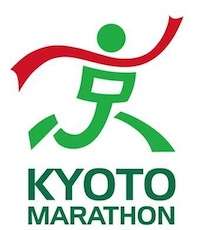Kyoto Marathon
The Kyoto Marathon (京都マラソン, Kyōto Marason) is an annual marathon sporting event for men and women over the classic distance of 42.195 kilometres which is held in mid February in Kyoto, Japan. The course starts at Nishikyogoku Athletic Stadium and pass through Kyoto Botanical Gardens and the right bank of Kamo river and finishes near Heian Jingu. It was one of the top ten most expensive of the world's biggest marathons by entry cost in 2015.[1]
| Kyoto Marathon | |
|---|---|
 | |
| Date | Third Sunday in February |
| Location | Kyoto, Japan |
| Event type | Road |
| Distance | Marathon |
| Established | 2012 |
| Course records | Men: 2:16:27 Women: 2:45:15 |
| Official site | Kyoto Marathon |
| Participants | 13,894 (2020) |
An event with the same name was held from 1969 to 1982.[2]
Results
Key: Course record
| Edition | Date | Men's winner | Time (h:m:s) | Women's winner | Time (h:m:s) |
|---|---|---|---|---|---|
| 1st | 11 March 2012 | 2:26:21 | 2:48:47 | ||
| 2nd | 10 March 2013 | 2:20:30 | 2:49:06 | ||
| 3rd | 16 February 2014 | 2:25:18 | 2:49:10 | ||
| 4th | 15 February 2015 | 2:21:14 | 2:45:30 | ||
| 5th | 21 February 2016 | 2:17:54 | 2:50:41 | ||
| 6th | 19 February 2017 | 2:20:32 | 2:45:15 | ||
| 7th | 18 February 2018 | 2:23:44 | 2:51:57 | ||
| 8th | 17 February 2019 | 2:16:27 | 2:51:40 | ||
| 9th | 16 February 2020 | 2:21:48 | 2:45:25 |
Kyoto Marathon (1969–1982)
| Edition | Date | Athlete | Country | Time | Notes |
|---|---|---|---|---|---|
| 1 | March 9, 1969 | Seiji Fukada | 2:17:43.8 | ||
| 2 | February 8, 1970 | Kokichi Uchino | 2:16:55.8 | ||
| 3 | February 7, 1971 | Hayami Tanimura | 2:13:45.2 | Course record | |
| 4 | February 6, 1972 | Susumu Sato | 2:17:37 | ||
| 5 | February 5, 1973 | Jack Foster | 2:14:53.4 | ||
| 6 | February 3, 1974 | Matti Vuorenmaa | 2:15:10.8 | ||
| 7 | February 9, 1975 | Mineteru Sakamoto | 2:17:15.4 | ||
| 8 | February 8, 1976 | Hatsuo Okubo | 2:16:50.2 | ||
| 9 | February 13, 1977 | Bill Rodgers | 2:14:26.2 | ||
| 10 | February 12, 1978 | David Chettle | 2:16:00.4 | ||
| 11 | February 11, 1979 | Masahiko Furuta | 2:18:08.2 | ||
| 12 | February 10, 1980 | Kazuo Takatori | 2:15:23 | ||
| 13 | February 15, 1981 | Koshiro Kawaguchi | 2:18:14 | ||
| 14 | February 11, 1982 | Masahiko Furuta | 2:17:58 | 2nd victory |
gollark: Actually, let's just make time begin with the Unix epoch.
gollark: If you want mildly less arbitrary, why not... base it on the Moon landings or something?
gollark: If you're adding 10000 to the existing system it's basically based on Jesus but offset a round number.
gollark: Well, yes, the fact that our calendar is based around the Jesus thing isn't really ideal, but there aren't exactly many better ones.
gollark: I guess it's good to stress-test date handling systems.
References
- "Running costs: what are the world's most expensive marathons?". The Guardian. 17 March 2015.
- "Sakamoto Wins Marathon". The New York Times. February 10, 1975.
External links
- Kyoto Marathon official website
- "Do you Kyoto?" (PDF). Distance Running 2015 Edition 2. Association of International Marathons and Distance Races. April 2015. pp. 18–19. Retrieved 2016-08-28.
- List of Certified Marathon Courses in 2016 — International Association of Athletics Federations
This article is issued from Wikipedia. The text is licensed under Creative Commons - Attribution - Sharealike. Additional terms may apply for the media files.
